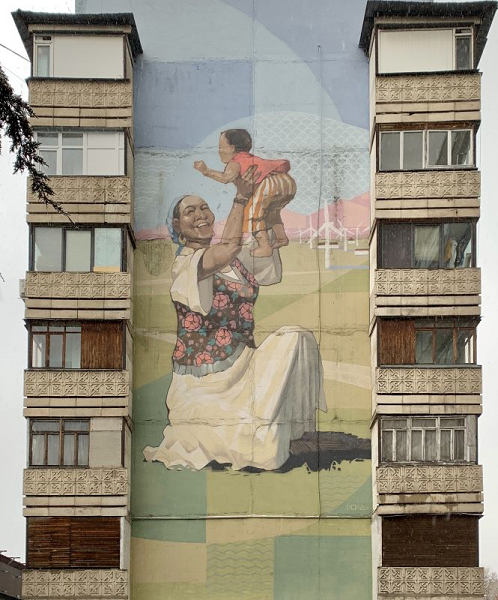Being Kazakh, Watching Borat 2, and Being Kazakh While Watching Borat 2
Review of Borat Subsequent Moviefilm
Written by Teen Writer Isabelle Nurzhanov and edited by Teen Editor Anya Shukla

From the Kazakh paper Karavan, Borat: Cultural Learnings of America for Make Benefit Glorious Nation of Kazakhstan is "... certainly not anti-Kazakh, anti-Romani or anti-Semitic… It is a cruelly anti-American movie.”
Pardon the melodrama, but Borat has always been a bit of a specter hanging over my head. Thankfully, most people my age have not seen the film, or at least don’t recall it if I say my ethnicity. For a certain section of movie-goers aged around 25 to 50, however, the Kazakhstani character Borat is usually what first comes to their minds when I answer some variation of, “What are you?”
With the sequel, Borat Subsequent Moviefilm, being released this past October, I was curious to see how exactly the Borat films portrayed Kazakhstan, and what the years of “my wife” jokes were all about. The sequel to the 2006 film, a mockumentary based upon a fictional Kazakhstani reporter visiting America, follows the same titular character as he attempts to give his daughter as a diplomatic gift to Vice President Mike Pence.
The movie is…fine. It fulfills its purpose of satirizing the American culture and, more specifically, a particular strain of American patriotism. But the political satire moments are not surprising, nor do they ever seem to go further than the same kind of humor that has propped up SNL for the past four years. This film isn’t doing anything groundbreaking by documenting bigotry or complacency, even if they are being expressed in absurd ways. Yes, we shouldn’t let ourselves get desensitized to that absurdity, but it’s what we’ve been seeing for a while now. The escalating absurdity of COVID and politics is the set-up and punchline to joke about 2020. And with the election already over and bigger systemic problems still existing and causing harm, the satire here feels insubstantial. Is this it? Do we really need scenes of Borat dressing as President Trump to go to the Republican National Convention, or convincing anti-maskers at a rally to sing a song about the “Wuhan Flu”?
As good as the intentions are in exposing the ugly racism, anti-Semitism, homophobia, and sexism (and tolerance of that discrimination) beneath the veneer of old-fashioned Americana, these issues seem obvious to anyone who is Jewish, nonwhite, female, LGBTQ+. Of course, it can be cathartic to see your experiences on screen, but it can also just be frustrating to have a movie be what validates your oppression as truthful. It’s exhausting to know that people will believe a movie over what minorities are actually telling them.
The comedy is a toss-up; since the film is so heavily reliant on uncomfortable scenarios, it’s truly dependent on whether you’re a fan of cringe comedy or not. I admittedly had to pause multiple times throughout the movie to catch a break. In addition, the emotional throughline of Borat and his daughter’s relationship falls flat, with the ridiculous and unscripted nature of the premise barring any kind of big character development between the two.

Beyond the content of the film, I question the usage of Kazakhstan, specifically. The screenwriters could’ve easily used a fictional country. But then again, it is darkly humorous to see American’s perceptions of “strange foreigners” from a real, albeit obscure, country. Even funnier is the idea that some people may think the country portrayed does not exist at all. (Note: True story. After I had told someone I was from Kazakhstan, they informed me that they “thought Borat had made it up.”) Despite this, the usage of Cyrillic and vague Slavic accents does make it seem as though Russian culture is all there is and all there ever was in Kazakhstan, which is slightly worrying with the context of Russian imperialism in Central Asia and the knowledge that most Westerners are unaware of the region.
The character of Borat didn’t intend to portray the real-life experiences of being Kazakh, but he has become a part of those real-life experiences. Despite Cohen’s intention of using Kazakhstan as a commentary on American’s ignorance of foreign nations, Borat seems to be the first thing Americans mention to any Central Asian person they meet. From the other Central Asian folks I know, online and in my family, most of them have had Borat references and jokes directed towards them. Do the films’ benefits outweigh those jokes towards Kazakhs and Central Asians? In the age of asking for more representation in American film and television, is it okay that this is what we get? I can’t speak on any kinds of anti-Semitism or anti-Romani sentiment, but I don’t think Borat Subsequent Moviefilm is anti-Kazakh, and I largely agree with the quotation from Karavan above. Despite these concessions, I’m still left wondering: is this the best filmmakers, comedians, and celebrities can do?
Lead photo credit: Sascha Baron Cohen in Borat Subsequent Moviefilm. Amazon Studios/TNS
The TeenTix Newsroom is a group of teen writers led by the Teen Editorial Staff. For each review, Newsroom writers work individually with a teen editor to polish their writing for publication. The Teen Editorial Staff is made up of 6 teens who curate the review portion of the TeenTix blog. More information about the Teen Editorial Staff can be found HERE.
The TeenTix Press Corps promotes critical thinking, communication, and information literacy through criticism and journalism practice for teens. For more information about the Press Corps program see HERE.

